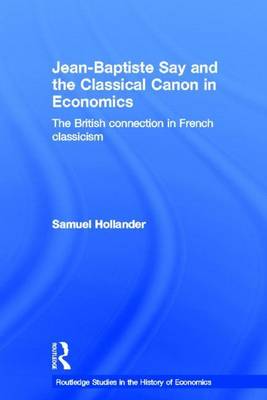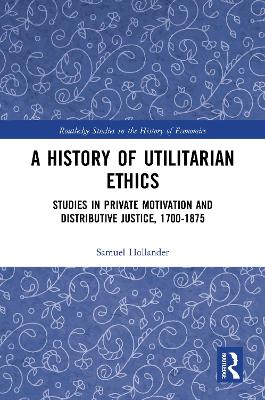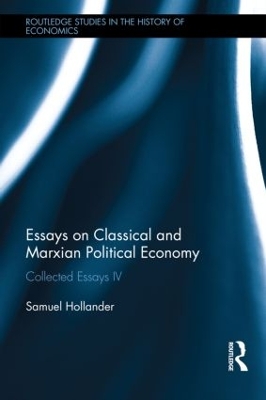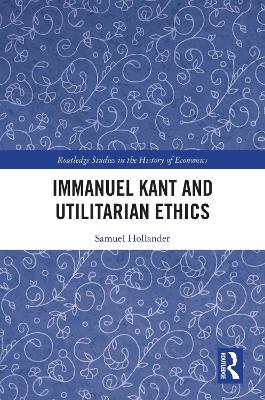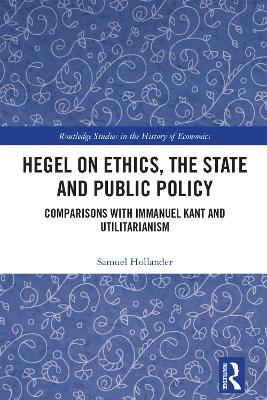Routledge Studies in the History of Economics
5 total works
Jean-Baptiste Say and the Classical Canon in Economics
by Samuel Hollander
This book explores the perceived paradigmatic conflict within British classical economics between the so called 'Ricardo School' and the contemporary French Economics of Jean-Baptiste Say. Samuel Hollander provides the reader with extensive evidence, utilizing all editions of Say's main texts and his lesser-known writings in order to demonstrate his adherence to much of Ricardian theory.
This intriguing book focuses on selected doctorinal issues and surrounding debates, and will interest all serious historians of economic thought, finding a place on the bookshelves of many economists across the world.
In this landmark volume, Samuel Hollander presents a fresh and compelling history of moral philosophy from Locke to John Stuart Mill, showing that a ‘moral sense’ can actually be considered compatible with utilitarianism. The book also explores the link between utilitarianism and distributive justice.
Hollander engages in close textual exegesis of the works relating to individual authors, while never losing sight of the intellectual relationships between them. Tying together the greatest of the British moral philosophers, this volume reveals an unexpected unity of eighteenth and nineteenth century ethical doctrine at both the individual and social level.
Essential reading for advanced students and researchers of the history of economic thought, political economy, history of ethics, history of political thought and intellectual history.
Samuel Hollander's work has been provoking debate for over four decades. This book brings together key contributions of recent years, in addition to some brand new pieces. The essays are introduced by a Preface in which Hollander reflects on his past work and reactions to it.
Highlights include two issues of particular current relevance. Conspicuous is an extensive chapter regarding Adam Smith's often neglected arguments for government intervention in the economy to correct market failures, and his critical view of the business class as an anti-social force. Important economists considered in relation to Adam Smith's position on the role of the state include Jeremy Bentham and the Scottish-Canadian John Rae. Similarly of high present-day interest is a re-examination of Karl Marx's theory of exploitation, or the notion of profits as "embezzlement," demonstrating Marx's effective abandonment of this perspective in the case of the small active businessman as distinct from the major joint-stock corporation.
Other papers demonstrate the close intellectual relationship between David Ricardo and Thomas Robert Malthus; the extensive common ground between the British school and the French under the leadership of Jean-Baptiste Say; the failure of a so-called anti-Ricardian opposition in Britain represented by Samuel Bailey; and the denial of a sharp discontinuity between "classical" and later "neo-classical" economics.
Finally, several biographical essays are included as well as an extension of the autobiographical account appearing in Collected Essays II.
Adopting a view of utilitarian ethics in which motivation in the public interest takes on greater weight than is generally appreciated, this book explores the extent to which the philosophy of Immanuel Kant is consistent with this nuanced version of utilitarianism.
Kant’s requirement that full ethical merit needs an agent to act purely ‘from duty’ to forward ‘the universal end of happiness’ rather than from a personal inclination to achieve that end clearly distinguishes his position from the version of utilitarian ethics adopted here. But this book also demonstrates, by reference to his formal ethical works and his lectures on ethics and anthropology, Kant’s approval of a secondary category of conduct – conduct ‘in conformity with’ duty – entailing other-regarding or ‘sympathetic’ motivation to advance general happiness, differing from the utilitarian position only in its meriting a qualified degree of ethical credit. After comparing Kant with eighteenth-century utilitarian writers from Locke to Smith, and also with Bentham and Malthus, the book evaluates reactions to Kant by J.S. Mill and Karl Marx and proposes Michel de Montaigne (1533–1592) as a ‘precursor’ for maintaining a ‘Kantian’ doctrine of conduct ‘from duty’ and for other shared features. In terms of public policy, the work demonstrates Kant’s justification of poor relief and reduced inequality, his proposal for a state education plan and his opposition to paternalism.
This book provides essential reading for academic specialists and students concerned with the interface of political economy and ethics, as well as the history of economic thought, history of political thought and intellectual history.
Drawing on a wide range of Hegel’s writings, this book analyses the Hegelian position on ethical action. This position is systematically compared with that of Immanuel Kant, the comparison emphasizing Hegel’s insistence on a morality grounded in an ‘ethical’ context which essentially refers to the state rather than the agent’s private will. The argument proceeds to the relationship between the state and the various components of civil society, and to the interaction between the state and the individual, and feeds into the debate regarding Hegel’s status in relation to Utilitarian Ethics and liberalism. This book carries further the researches published in A History of Utilitarian Ethics and Immanuel Kant and Utilitarian Ethics and will be of interest to readers in the history of political economy, political science, philosophy and ethics.
